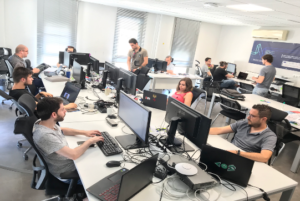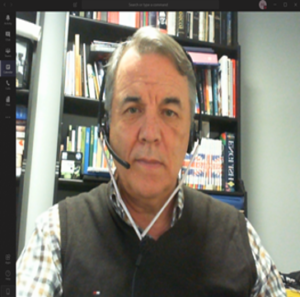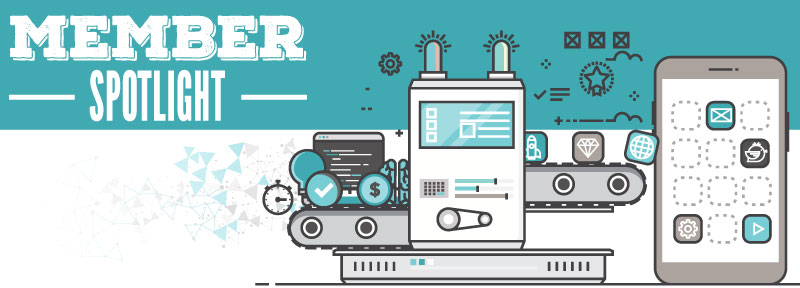With the COVID-19 outbreak and the strict measures put in place by many governments around the world, our daily lives are changing. To make sure we can stay in touch with our members, we launched a bi-weekly virtual coffee hour to discuss relevant issues and concerns. If you’re interested in joining, please let us know!
The tech industry, and in particular software and app developers, is at the forefront of ongoing efforts not only to detect and track the COVID-19 outbreak, but also to make it easier for all of us to take our lives and jobs online. Teleworking, home schooling, and online communication apps are just a few examples of how modern technology helps us to remain connected and productive while staying at home. App developers and tech SMEs play an essential role in mitigating the impact of this crisis on our economies. In this blog post and through our COVID-19 resources page, we are highlighting how our members adapt, innovate, and launch new initiatives during these difficult times of change.
During our first virtual coffee hour, we spoke to Fernando Guerrero, CEO of SolidQ and Nouss Intelligence. SolidQ is a global provider of training services and technical consulting for Microsoft’s business analytics and data management platforms. SolidQ’s solutions help customers to architect, integrate, and optimise their use of data. Nouss provides dynamic real-time intelligent planning capabilities to institutions and companies in several market verticals by designing and developing artificial intelligence engines. Both companies are in southern Spain, one of the countries hardest hit by the COVID-19 outbreak.


The Nouss team, like most of us, normally works together in their office (left). Now, Fernando and his colleagues work remotely from home (right).
For Fernando, the crisis isn’t affecting his production as much as it is for his clients. They are facing budget and staff issues and are scaling down, at least temporarily. For example, car manufacturers had to shut down their assembly plants and repair and maintenance shops, and retailers had to close all their stores. This is directly affecting Fernando’s teams who are working remotely with those companies using cloud solutions like Azure. In general, however, he is doing everything he can to keep everyone employed. Most of his colleagues already work from home to some extent, so this is not too much of a change for them. Fernando is mostly concerned about the effects of the crisis for his employees’ family members who work in different fields and how to show his clients that they can work efficiently from home. Entire processes, habits, and mentalities are undergoing significant transformations.
One big part of being able to be helpful during the COVID-19 outbreak is data access and data sharing. To Fernando, it’s clear that nobody can do any type of data analysis without data. While the European Union (EU) is trying to address current data access and sharing issues by creating a Single Data Market with its new Data Strategy, additional measures might be necessary. Fernando suggested, it may be beneficial to establish a system that is similar to Spain’s approach to organ donations. Spain is one of the leading countries for organ donations – not necessarily because they are the most generous people, but because Spanish citizens are organ donors by default unless they opt out. A similar system, with anonymized data that is made available to appropriate research organisations, may be extremely useful in the context of data sharing. Finland is already doing this, and Germany is asking its citizens to contribute health and research data as well.
While governments around the world are trying to prevent businesses from shutting down and calling on SMEs to provide innovative solutions, Fernando says he yet has to see results and concrete actions even if he encourages the initiatives. To him, it’s not clear what resources are available, where funding opportunities are, and what restrictions there are in different EU countries.
As bleak as all this sounds, there is opportunity here for small tech companies like Nouss and SolidQ.
Nouss is looking at opportunities where its expertise can help the authorities tackling the pandemic. They can provide smart planning solutions for the distribution of goods, including the search, request for, and delivery of packages. The company recently responded to tenders published by Spain’s Ministry of Science and Innovation to mitigate the effect of the crisis by collaborating on intelligence planning. SolidQ provides analytics and can use data to make predictions on the spread of the disease and number of casualties available to government agencies. Planning systems, data, and artificial intelligence solutions can all play a significant role in mitigating the impact of this public health crisis.

Fernando and Spain’s Minister of Science and Innovation, Pedro Duque, at Nouss’ office in Alicante. He visited Nouss a couple months before Spain implemented a nationwide lockdown due to COVID-19.
Companies like SolidQ and Nouss, and countless other SMEs around the world, are doing all they can to keep their employees and to make helpful contributions to fight against the spread of COVID-19. We, at the App Association are doing our best to understand the challenges our members are facing and to help them through this difficult time. If you are developing innovative solutions to fight COVID-19, are struggling with the impact this crisis is having on your business, or have any other thoughts to share please reach out! We’re looking forward to your insights and working together to develop policy solutions.
